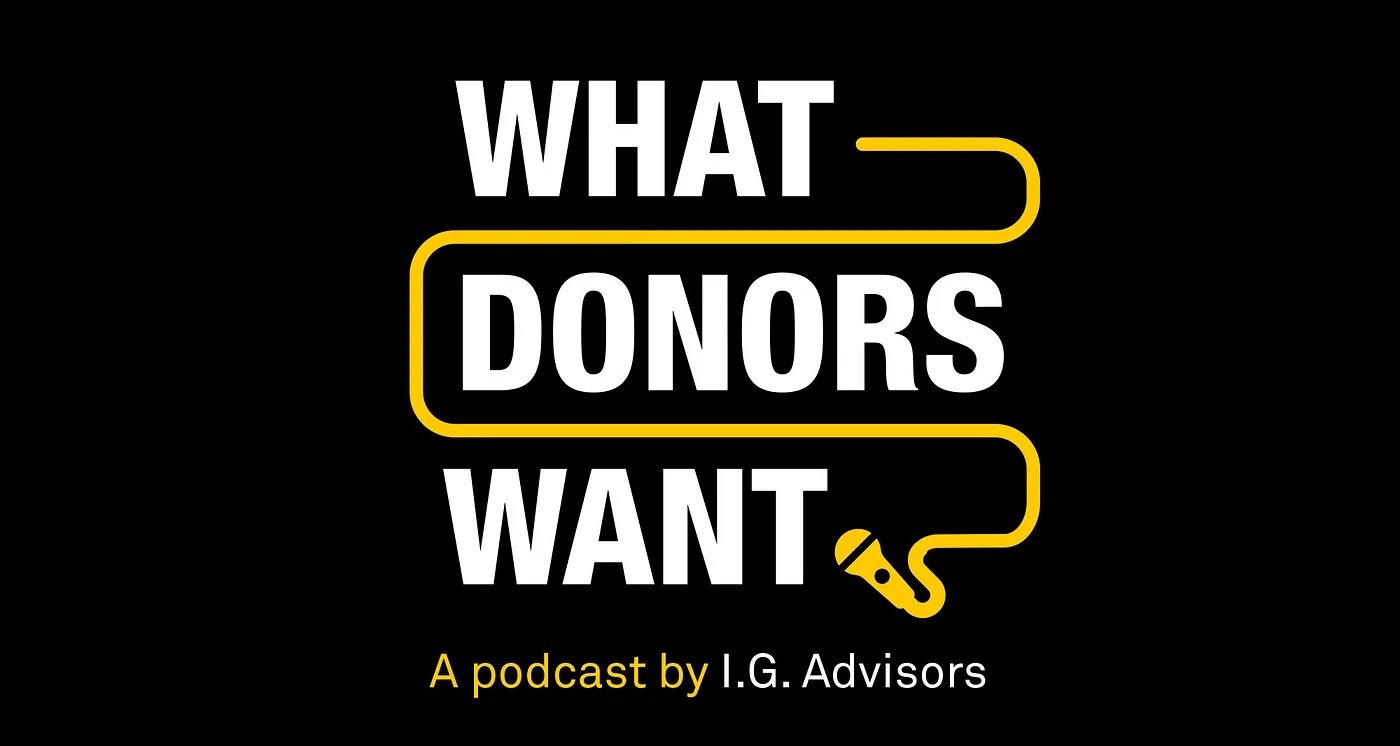What Donors Want — Fundraising Advice Straight from the Donor’s Mouth

What Donors Want — Fundraising Advice Straight from the Donor’s Mouth — Guest Post by Rachel Stephenson Sheff
Major gift fundraising is an intuitive blend of art and science, with relationship-building at its core. In today’s global philanthropy landscape, the distance between donors and fundraisers is shrinking, with strategic partnerships on the rise and competition at its fiercest. What are the implications of this on the non-profit sector and how can fundraisers adapt to this shifting context?
In partnership with strategy consultancy, I.G. Advisors, I produce a podcast called What Donors Want where we ask donors questions just like these. The premise is simple: to have frank, engaging (and slightly irreverent) conversations about major gifts fundraising with donors themselves — giving fundraisers advice straight from the donor’s mouth. 10 interviews later, we’ve wrapped up Season 1, which features a broad range of guests — from The Bill & Melinda Gates Foundation, to Comic Relief, DLA Piper, NoVo Foundation, Rockefeller and several brilliant philanthropists. While, of course, each episode and ‘type’ of funder has a unique take on fundraising best practice, what shines through the season are strong threads of commonality defining what an excellent relationship means in practice.
For example, donors consistently expressed a desire to build ‘true, holistic’ partnerships, where challenging and bringing stimulus to new ideas is built into the dynamic from the beginning. As Jennifer Alcorn (Bill & Melinda Gates Foundation) so brilliantly noted, “fundraisers often look at us and think dollar signs — when what we want people to think is partner. Somebody who’s going to provide thinking and strategy.” This sentiment was echoed by all podcast guests — from programme officers through individuals — who said this is the only “healthy way to have a [funding] relationship” (Alfonsina Peñaloza, Hewlett Foundation) and they “get a buzz [from] the involvement” (Lynne Smitham, Kiawah Trust).
We’ve also spoken in detail with our guests about accountability on both sides of the table and if there’s one thing to take away from Season 1, it’s that you should never shy away from (diplomatically) speaking up if you think a donor should approach something differently. Many actually want their partners “to push back and say ‘I don’t think that’s a good idea’” (Zia Khan, Rockefeller Foundation) — and “want to be problem-solving alongside the grantee because [they’re] learning just as much” (Jennifer Alcorn, Bill & Melinda Gates Foundation).
Throughout the season, we deep dive into concepts like these to highlight tangible, donor-centric recommendations for fundraisers. With more insights than could ever fit into one blog post, you can listen to What Donors Want — and our recap of Season 1 — on iTunes, Spotify and SoundCloud. And stay tuned for Season 2, coming to your headphones shortly.
Originally published at www.bethkanter.org on February 7, 2019.
As we close the chapter on 2024 and step into a new year, our Advisor, Harriette, finds herself reflecting on what’s needed to move philanthropy forward in 2025.
It’s not a groundbreaking revelation that staff wellbeing and burnout are huge challenges our sector is facing right now, and the sector-wide lack of investment in professional development has a lot to answer for.
Our Associate Advisor Charly makes the case that greater investment in your grantmaking team = greater impact for your organisation, and beyond.
While philanthropy and football may seem worlds apart, I’ve started thinking about the many similarities that can provide valuable lessons for those in the philanthropic sector. I for one, am always learning about the essential elements of football that can inspire and inform effective philanthropy.
Through the power of collective design, our fundraiser and grantmaker #FixTheFlow Fellows have imagined the future of our philanthropic funding system, and we should all listen carefully.
In the coming months, our Associate Carli is exploring the complexities of social innovation and will share her learnings, insights, and questions with you.
I.G.’s CEO Emily shares some of the mistakes and challenges she found during her leadership journey, and what she learned and will share in I.G.’s new Leadership Lab.
I’m expected to show up as a leader, but don’t feel like a leader. Introducing Impact & Grow: A Leadership Lab.
Leveraging Limited Funds For Humanitarians: Insights from the 2024 #HX24 conference, organised by Save the Children UK and the Humanitarian Leadership Academy.
Social enterprises have a particularly interesting relationship with Monitoring, Evaluation and Learning (MEL) as they need to capture both the financial and social/ environmental impact of their work, and speak to a wide range of potential funders and investors. Caitlin McLoughlin chatted to Abhinav Khanal, Co-Founder and Executive Director of Bean Voyage, to explore this further.
Image Credit: Bean Voyage
A round up of everything the I.G. team did in 2023!
Introducing a new, dedicated funders stream to I.G.’s #FixTheFlow Fellowship! We’re accepting applications until 17th November (for a 2024 start). Join our movement at fixtheflow.org
Join us for one (or all!) our eight workshops in our Autumn Training Series, where we will cover some of the trickiest topics facing fundraisers today.
What does meaningful and effective learning actually mean in practice?
Our Advisor Caitlin interviews Kore Global’s Emily Boost on learning how to learn and all things feminist evaluation and learning.
How do we balance our passion and our desire to give our best, whilst not being consumed by failure to live up to our own or others’ expectations?
At I.G. Advisors (I.G.), we’re often approached to design and implement evaluations for our clients to understand the impact of their grantmaking, fundraising or programmatic strategies, and identify opportunities for evolution.
The ‘lone saviour’ approach won’t cut it (and it also might destroy you).
It’s hard to believe it now that we’re living through a polycrisis, but the financial crisis and Great Recession of the 00s felt like a once-in-a-lifetime jolt to the world order at the time.
What you can learn from others leading philanthropic networks like yours
‘Well, we could have called that one.’
I.G. Advisors (I.G.) recently had the pleasure of collaborating with The Big Give and Rosa on the Women and Girls Match Fund.
Being a parent is often a thankless task. You take something and nurture it, treating it with love and care, losing sleep and worrying if — against all odds — , it will achieve its full potential and become the best it can be. It may never, ever show gratitude for your sacrifice. And then one day it will grow up and leave.
New I.G. Insights report explores how fundraisers and funders can support digital fundraising for racial justice issues.
#TaxPhilanthropy — wealth holders have the power to pay more tax right now even if governments fail to reform their policies
How starting small might be the most effective way to change the world.
An insight into “Modern Grantmaking: A Guide for Funders Who Believe Better is Possible”
A couple of weeks ago, I.G. brought back its much-loved book club event for our first in-person get together in over a year.
Podcast listeners — a new episode of What Donors Want is out! We had the honour of speaking with David Simas, CEO of the Obama Foundation.
Senior Social Impact Advisor (I.G. Advisors & Lightful)






























